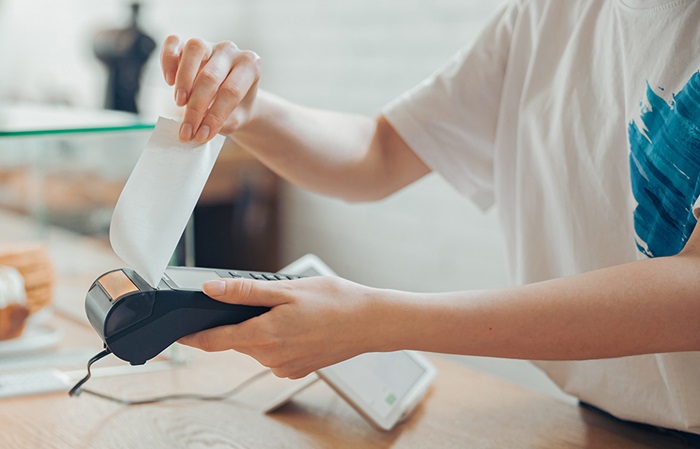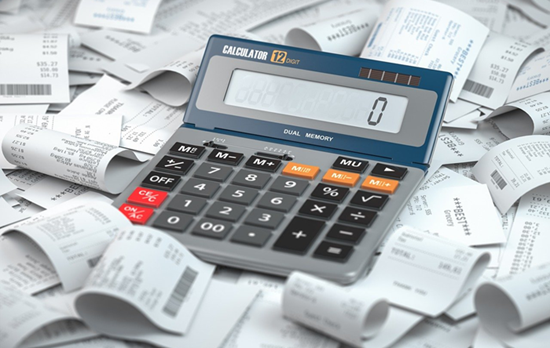As shoppers become more environmentally-conscious, the high street stalwart could become a relic of the past...

The humble paper receipt has been a staple of wallets, back pockets and the bottom of bags for decades. Whether shoppers are returning an unwanted birthday present, checking monthly bank statements or just keeping a memento of a meaningful purchase from an independent shop, a printed receipt has been a traditional part of the shopping experience.
However, customers might now be starting to change their minds. In fact, a new survey from retail software specialist Yocuda suggests that almost three-quarters of UK shoppers now prefer digital over paper when given the choice at checkout, with over half wanting more retailers to offer digital receipts over printed ones.
Sustainability and environmental impact
A major reason for this shift in attitudes can be explained by the increased importance consumers place on sustainability and the environment. Yocuda’s research indicates that 60% of shoppers view the automatic printing of paper receipts as environmentally wasteful and even more would switch to digital if they knew the environmental cost. Importantly, this figure rises to 87% among 18-25 year-olds.
Did you know?
Bira members can get exclusive reduced rates with 1st Waste Management, with all regulation compliance included in their service.
These generations of customers may be young now but will start to form the bedrock of high street trends and preferences as time goes on, and environmental concerns may well be a priority when it comes to their purchasing decisions, including when buying from independent retailers.
Convenience, ease of use and personalisation
What might be more surprising is the amount of survey respondents that point to the inconvenience of paper receipts. 66% have lost a paper receipt needed for a return, while 75% have discarded receipts they meant to keep. Digital receipts, the research suggests, are seen as “beneficial for easier returns and reducing frustration.”

There does still remains a case for digital receipts not having the same level of familiarity as paper, with a printed proof of purchase being something all shoppers have been exposed to and got to grips with. But while the ubiquitous presence of paper is a factor, digital receipts could bridge that gap with more personalisation and links to reward systems. Yocuda’s research shows that 80% of shoppers surveyed want digital receipts linked to loyalty cards – this monetary incentive could prove to be a key counterpoint to the familiarity of paper.
Can digital receipts be trusted?
One reservation that is harder for digital receipts to overcome, however, is the issue of trust and data security. People who receive paper receipts don't have to worry about privacy concerns; unlike digital receipts, there's no need to share personal information like a phone number or email address to get proof of purchase.
The topic of data privacy has been in the media spotlight a lot within the last few years and digital receipts will require yet more handling of people’s personal details, which some shoppers will feel uncertain about. Addressing these concerns will be key to a more widespread adoption of non-physical proof of purchase.
The future of digital and paper receipts
As more and more shoppers are becoming more environmentally-concious and aware of the convenience of digital solutions, the phasing out of the paper receipt could be getting closer. Familiarity and security concerns will need to be quelled, but evidence is showing that paper may be making way for digital on the high street sooner rather than later.
Did you know?
Global Payments’ specialist UK business team at takepayments offer Bira members the option of texting or emailing receipts to your customers, or skipping the receipt all together. No unnecessary printing!
Stay in the loop on sustainability with our helpful hub
In the often fast-moving world of sustainability it can be intimidating to even attempt to stay up to date with the latest eco updates, not to mention working out what is relevant to your business.
Bira can help you handle this with our Sustainability in Retail Hub, which features the latest information that you need to know. Visit the hub today and keep on top of the sustainability information that matters to you.
Latest News
-
Independent retailers mingle with top suppliers for 'Mica Exchange' in Peebles, Scotland
Mica held its annual ‘Mica Exchange’ gathering over the weekend of 16th - 17th September at the picturesque Peebles Hydro Hotel & Spa in the Scottish Borders. The Exchange is an invitation-only event taking place in a different part of the UK each year that brings together Mica's...
-
Dexam launches new ranges in partnership with the RHS
Following the success of their existing collections, Dexam have launched two new ranges in partnership with the Royal Horticultural Society (RHS). The Birds and Gertrude Jekyll textile ranges are now in stock and are made from organic cotton.
-
Bira CEO comments on the rise of shoplifting in UK stores & the effect on indie retailers
Shoplifters in the UK are becoming increasingly "emboldened" and appear to be operating under more organised and coordinated efforts, often orchestrated by organised criminal groups. These groups steal to order, fuelling a growing black-market trade in various goods, from cheese and meat to luxury items. Retail experts have expressed concern over the rise of these "grab-and-go" raids and their impact on businesses.
-
Understanding the UK Plastic Packaging Tax: Registration, Returns, and Payments
The Plastic Packaging Tax (PPT), implemented on April 1, 2022, marked a significant step towards reducing the environmental impact of plastic packaging in the United Kingdom. For businesses engaged in the manufacture or import of 10 tonnes or more of plastic packaging over a 12-month period, it is crucial to grasp the registration, return, and payment obligations associated with this tax. Even if your packaging comprises 30% or more recycled plastic, registration for PPT is mandatory and can be conveniently completed on the GOV.UK platform.